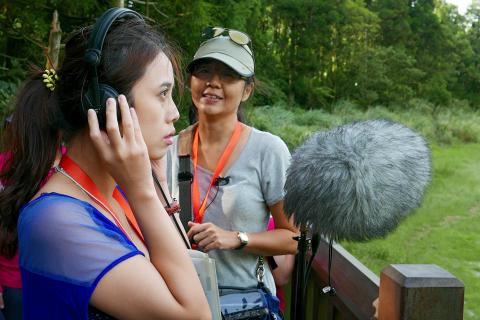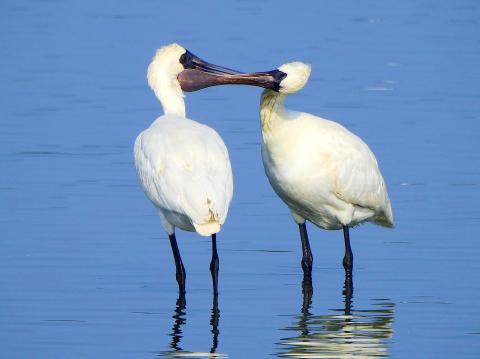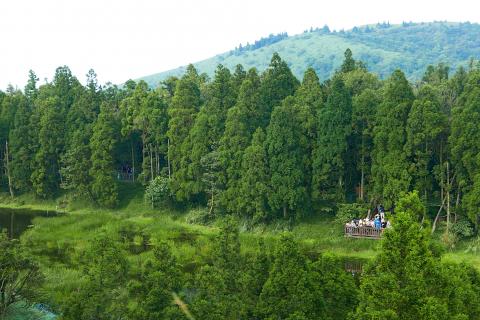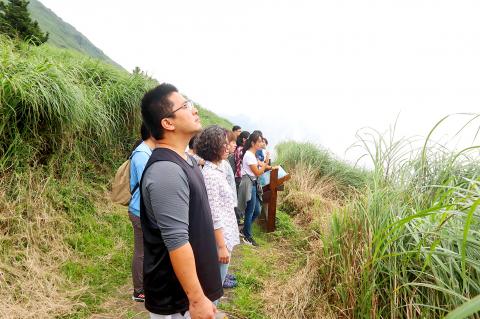Lin Kun-hai (林昆海) says that for many karaoke in the mountains is a popular way to finish a hike.
“Taiwanese are not big on tranquility,” says Lin, the director-general of the Kaohsiung Wild Bird Society.
But on Taiwan’s only nationally-recognized “quiet mountain trail” (寂靜山徑) — 1,840m above sea level by the banks of Cueifong Lake (翠峰湖) in Yilan — silence reigns. A menagerie of birdcalls pierces the air with startling clarity.

Photo courtesy of Taiwan Soundscape Association
To soundscape advocates, listening to nature and cultivating quietude can ironically be the best way to learn how to live with other people.
“Before we open our mouths to find fault with or chide someone, can we take pause?” asks Hsieh Wen-chi (謝文綺), a coordinator of Taiwan Listening Day, which for the past two years has been designated on July 17.
From today until August 24, the Taiwan Soundscape Association is turning up the volume on the nation’s aural heritage through a series of listening tours in Taipei, Taichung and Kaohsiung. Led by soundscape, wildlife and urban rejuvenation specialists, this is the first time that activities are taking place outside the capital.

Photo courtesy of Taiwan Soundscape Association
The program starts today with a sunrise listening tour along the Alishan Forest Railway (阿里山林業鐵路) in Chiayi. Blending urban and rural settings, different tour sites reflect the varied tones of Taiwan’s development and co-existence of human and natural habitats.
In Taipei and Taichung, for example, participants learn to approach the familiar scene of each city’s Zhongshan Road with new ears. Other locations include Yangmingshan (陽明山) and Yuanshan (圓山) in Taipei as well as Taichung’s Dakeng trail (大坑) and Taichung Park (臺中公園). In Kaohsiung, highlights include a former navy ship-making facility and the endangered Cieding Wetlands (茄萣濕地), home to the black-faced spoonbill.
Soundscape advocates want to equip participants not just with a deeper capacity for listening, but also a deeper respect for their fellow creatures.

Photo: CNA
“Sound demonstrates the power struggle between humans and nature,” Lin says.
For Laila Fan (范欽慧), founder and chairperson of the Taiwan Soundscape Association who first led the push for a “quiet mountain trail” in 2013, listening deeply to natural as well as human-made sounds is a way of forging equality and environmental conservation
“Sounds of nature tend to be interpreted as the background music to human activity,” Fan says. “Through Taiwan Listening Day, we are elevating them to the same position as human-made sounds.”

Photo courtesy of Taiwan Soundscape Association
As Taiwan continues to develop, those sounds are also changing. Hsieh says that local parks are increasingly transforming into gathering places for migrant workers. Rather than keeping migrant communities at a distance, a sound tour of Taichung Park seeks to reacquaint locals with their changing city.
“[Migrant workers] will continue to interact closely with us,” Hsieh says. “There’s no question about it. So we have to pursue more cultural exchange and demonstrate Taiwan’s diversity.”
The young are a natural audience for the activities, given the interactive nature of learning about heritage and history through sound. But soundscape advocates say that encouraging adults to listen more keenly to the voices of the younger generation is an objective in itself.

Photo courtesy of Wade Lee
“Most young people are always being informed or told of others’ thoughts and opinions,” says Tu Chun-ching (凃峻清), National Taiwan University history undergraduate and editor-in-chief of Rail Youths (鐵道青年) magazine. “As youths, we hope for the possibility of hearing other types of sounds.”
Countries around the world have long primped their skylines and landscapes for global consumption. Soundscapes are rarely given much consideration, although Fan says they can be as unique as a fingerprint.
In Taiwan’s case, that may be a matter of national pride and survival.

Photo courtesy of Taiwan Soundscape Association
“Taiwan’s voice is not listened to by the rest of the world,” Fan says. “Even if the world can’t hear us, we should at least be willing to hear ourselves.”
■ Tours are conducted in Mandarin. All tours in Taipei are fully registered, while some places remain for tours in Taichung and Kaohsiung. Most are free, but online registration is required at: www.soundscape.org.tw/2019-listening-day.

That US assistance was a model for Taiwan’s spectacular development success was early recognized by policymakers and analysts. In a report to the US Congress for the fiscal year 1962, former President John F. Kennedy noted Taiwan’s “rapid economic growth,” was “producing a substantial net gain in living.” Kennedy had a stake in Taiwan’s achievements and the US’ official development assistance (ODA) in general: In September 1961, his entreaty to make the 1960s a “decade of development,” and an accompanying proposal for dedicated legislation to this end, had been formalized by congressional passage of the Foreign Assistance Act. Two

Despite the intense sunshine, we were hardly breaking a sweat as we cruised along the flat, dedicated bike lane, well protected from the heat by a canopy of trees. The electric assist on the bikes likely made a difference, too. Far removed from the bustle and noise of the Taichung traffic, we admired the serene rural scenery, making our way over rivers, alongside rice paddies and through pear orchards. Our route for the day covered two bike paths that connect in Fengyuan District (豐原) and are best done together. The Hou-Feng Bike Path (后豐鐵馬道) runs southward from Houli District (后里) while the

March 31 to April 6 On May 13, 1950, National Taiwan University Hospital otolaryngologist Su You-peng (蘇友鵬) was summoned to the director’s office. He thought someone had complained about him practicing the violin at night, but when he entered the room, he knew something was terribly wrong. He saw several burly men who appeared to be government secret agents, and three other resident doctors: internist Hsu Chiang (許強), dermatologist Hu Pao-chen (胡寶珍) and ophthalmologist Hu Hsin-lin (胡鑫麟). They were handcuffed, herded onto two jeeps and taken to the Secrecy Bureau (保密局) for questioning. Su was still in his doctor’s robes at

Mirror mirror on the wall, what’s the fairest Disney live-action remake of them all? Wait, mirror. Hold on a second. Maybe choosing from the likes of Alice in Wonderland (2010), Mulan (2020) and The Lion King (2019) isn’t such a good idea. Mirror, on second thought, what’s on Netflix? Even the most devoted fans would have to acknowledge that these have not been the most illustrious illustrations of Disney magic. At their best (Pete’s Dragon? Cinderella?) they breathe life into old classics that could use a little updating. At their worst, well, blue Will Smith. Given the rapacious rate of remakes in modern